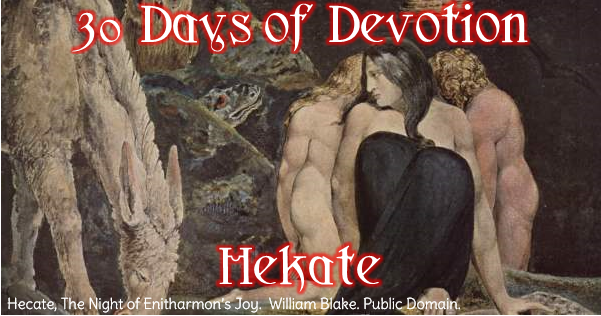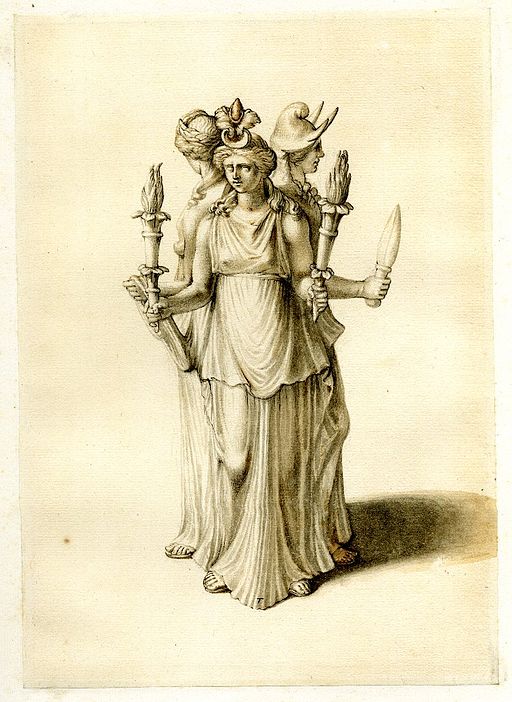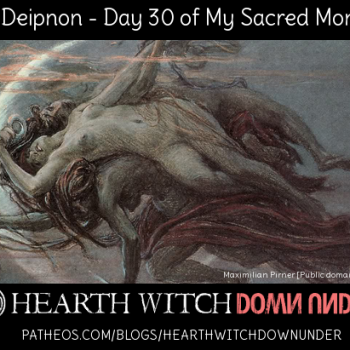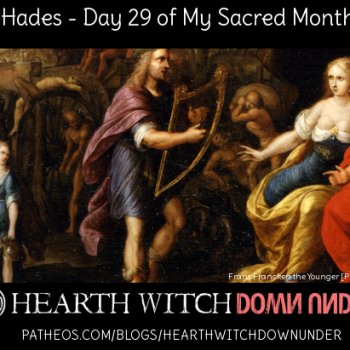This post is part of a blog challenge series, 30 Days of Devotion, to Hekate. Day 4 and we are looking at my favourite myths about Hekate.

Today we are looking at my favourite myth/s of Hekate. This is a hard one, because in truth there are actually little in the ways of myths that are about Hekate. She is mentioned in various myths, of course, but She doesn’t really have any that are focused on Her specifically.
Best known perhaps is Hekates role in the Mysteries, for Hekate is instrumental in Demeters search for Kore/Persephone. The following is a few different passages from the Homeric Hymn to Demeter.
[…]But no one, either of the deathless gods or of mortal men, heard her voice, nor yet the olive-trees bearing rich fruit: only tender-hearted Hecate, bright-coiffed, the daughter of Persaeus, heard the girl from her cave, and the lord Helios, Hyperion’s bright son, as she cried to her father, the Son of Cronos. But he was sitting aloof, apart from the gods, in his temple where many pray, and receiving sweet offerings from mortal men. […]
But when the tenth enlightening dawn had come, Hecate, with a torch in her hands, met her, and spoke to her and told her news: ‘Queenly Demeter, bringer of seasons and giver of good gifts, what god of heaven or what mortal man has rapt away Persephone and pierced with sorrow your dear heart? For I heard her voice, yet saw not with my eyes who it was. But I tell you truly and shortly all I know.’
So, then, said Hecate. And the daughter of rich-haired Rhea answered her not, but sped swiftly with her, holding flaming torches in her hands. So they came to Helios, who is watchman of both gods and men, and stood in front of his horses[…]
Then bright-coiffed Hecate came near to them, and often did she embrace the daughter of holy Demeter: and from that time the lady Hecate was minister and companion to Persephone.[…]

So we see that Hekate, along with Helios, is the only one to hear Kores cries, She tells Demeter what She heard and led Her to Helios, She was there at the end when mother and daughter were finally reunited and She becomes an Underworld Goddess due to Her association with Persephone.
I really like how it speaks of Her as being tender hearted, so much lore about Hekate today makes her out to be some harsh and forbidding Goddess – and She can be. But She is also extremely lovely and loving, and you don’t hear about that as much.
But I think my favourite myth about Hekate is actually from Theogony, which tells how Hekate is honoured by Zeus and the other Gods.
And she [Asteria] conceived and bare Hecate whom Zeus the son of Cronos honoured above all. He gave her splendid gifts, to have a share of the earth and the unfruitful sea. She received honour also in starry heaven, and is honoured exceedingly by the deathless gods. For to this day, whenever any one of men on earth offers rich sacrifices and prays for favour according to custom, he calls upon Hecate. Great honour comes full easily to him whose prayers the goddess receives favourably, and she bestows wealth upon him; for the power surely is with her.
For as many as were born of Earth and Ocean amongst all these she has her due portion. The son of Cronos did her no wrong nor took anything away of all that was her portion among the former Titan gods: but she holds, as the division was at the first from the beginning, privilege both in earth, and in heaven, and in sea. Also, because she is an only child, the goddess receives not less honour, but much more still, for Zeus honours her.
Whom she will she greatly aids and advances: she sits by worshipful kings in judgement, and in the assembly whom she will is distinguished among the people. And when men arm themselves for the battle that destroys men, then the goddess is at hand to give victory and grant glory readily to whom she will. Good is she also when men contend at the games, for there too the goddess is with them and profits them: and he who by might and strength gets the victory wins the rich prize easily with joy, and brings glory to his parents.
And she is good to stand by horsemen, whom she will: and to those whose business is in the grey discomfortable sea, and who pray to Hecate and the loud-crashing Earth-Shaker, easily the glorious goddess gives great catch, and easily she takes it away as soon as seen, if so she will. She is good in the byre with Hermes to increase the stock. The droves of kine and wide herds of goats and flocks of fleecy sheep, if she will, she increases from a few, or makes many to be less. So, then. albeit her mother’s only child, she is honoured amongst all the deathless gods. And the son of Cronos made her a nurse of the young who after that day saw with their eyes the light of all-seeing Dawn. So from the beginning she is a nurse of the young, and these are her honours.
While it’s not some fun and super exciting story from mythology, it is nonetheless my favourite piece about Her. Because it shows just how vast and powerful She is, with dominion over, well, almost everything it seems. This really shows a lot about Her, again outside of the commonly discussed ‘darker’ and scary aspects we see so much today. And I love that.
30 Days of Deity Devotion
1 – A basic introduction of the deity
2 – How did you become first aware of this deity?
3 – Symbols and icons of this deity
4 – A favourite myth or myths of this deity
5 – Members of the family – genealogical connections
6 – Other related deities and entities associated with this deity
7 – Names and epithets
8 – Variations on this deity (aspects, regional forms, etc.)
9 & 27 – Common mistakes and worst misconceptions about this deity
10 – Offerings – historical and UPG
11 – Festivals, days, and times sacred to this deity
12 – Places associated with this deity and their worship
13 – What modern cultural issues are closest to this deity’s heart?
14 – Has worship of this deity changed in modern times?
15 – Any mundane practices that are associated with this deity?
16 – How do you think this deity represents the values of their pantheon and cultural origins?
17 – How does this deity relate to other gods and other pantheons?
18 – How does this deity stand in terms of gender and sexuality? (historical and/or UPG)
19 – What quality or qualities of this god do you most admire? And find the most troubling?
20 & 21 – Art and music that reminds you of this deity
22 – A quote, a poem, or piece of writing that you think this deity resonates strongly with
23 – Your own composition – a piece of writing about or for this deity
24 & 25 – A time when this deity has helped you, and refused to help
26 – How has your relationship with this deity changed over time?
28 – Something you wish you knew about this deity but don’t currently
29 – Any interesting or unusual UPG to share?
30 – Any suggestions for others just starting to learn about this deity?
















